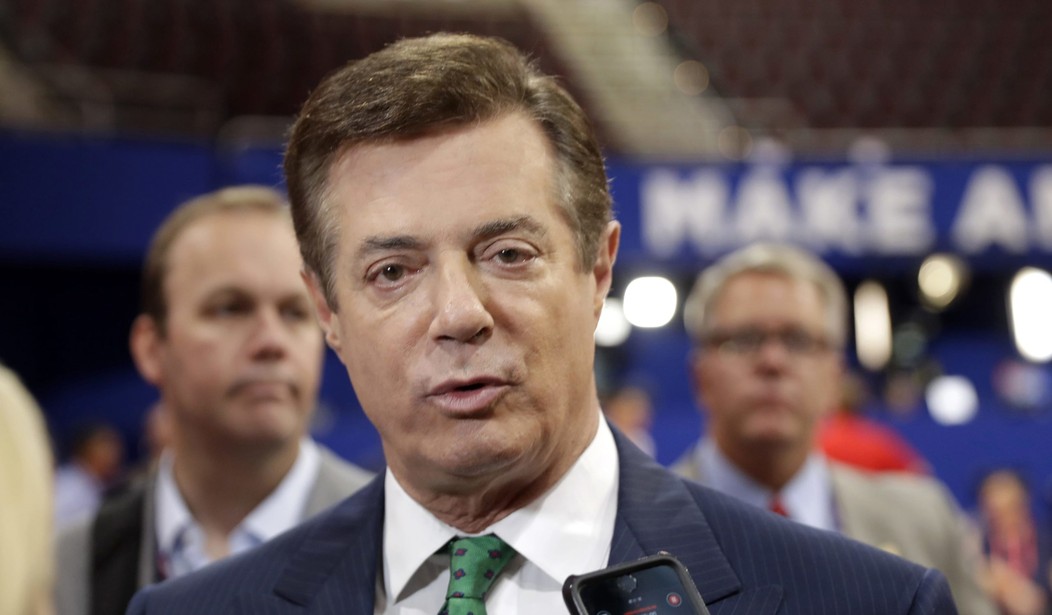Although Robert Mueller has accused former Trump campaign chief Paul Manafort of “conspiracy against the United States,” former federal prosecutor Andrew McCarthy explains that his charges aren’t even half as exciting (or troubling, depending on your perspective) as you might think:
Do not be fooled by the “Conspiracy against the United States” heading on Count One (page 23 of the indictment). This case has nothing to do with what Democrats and the media call “the attack on our democracy” (i.e., the Kremlin’s meddling in the 2016 election, supposedly in “collusion” with the Trump campaign). Essentially, Manafort and his associate, Richard W. Gates, are charged with (a) conspiring to conceal from the U.S. government about $75 million they made as unregistered foreign agents for Ukraine, years before the 2016 election (mainly, from 2006 through 2014), and (b) a money-laundering conspiracy.
Although there are twelve counts in all, those are the two most important allegations. Manafort’s “conspiracy against the United States” doesn’t refer to him trying to undermine the election process by working with Russia, but to his “alleged failure to file Treasury Department forms required by the Bank Secrecy Act.” Also, it refers to his alleged failure to register as a foreign agent from 2008 to 2014.
According to McCarthy, Mueller’s case “seems shaky and overcharged,” at least “on first glance.” For instance, regarding the offense of failing to register as a foreign agent, McCarthy explains that although that count may be a “slam-dunk,” it “is a violation that the Justice Department rarely prosecutes criminally.” Instead, the Justice Department’s practice is to “encourage people to register, not indict them for failing to do so.”
Oh, and then there’s this:
It may well be that Manafort and Gates made false statements when they belatedly registered as foreign agents, but it appears that Mueller’s office has turned one offense into two, an abusive prosecutorial tactic that flouts congressional intent.
With regards to the money-laundering conspiracy allegation against Manafort (and his friend Richard W. Gates), McCarthy opines that this accusation is actually “far from slam-dunk”:
For someone to be guilty of laundering, the money involved has to be the proceeds of criminal activity before the accused starts concealing it by (a) moving it through accounts or changing its form by buying assets, etc., or (b) dodging a reporting requirement under federal law.
Now, it is surely a terrible thing to take money, under the guise of “political consulting,” from an unsavory Ukranian political faction that is doing the Kremlin’s bidding. But it is not a violation of American law to do so.
What’s most remarkable about this indictment is that Mueller doesn’t even off-handedly refer to possible collusion with Russia during the 2016 presidential campaign.
McCarthy rightfully calls that “a boon” for Trump, adding that it “appears to reaffirm former FBI director James Comey’s multiple assurances that Trump is not a suspect.”
What does this all mean? Two possibilities:
1. Mueller is using these allegations against Manafort to squeeze him, hoping he has some information on possible collusion between the Trump campaign and Russia back in 2015 – 2016.
2. Mueller simply didn’t find any evidence of illegal collusion, which is why he decided to focus on tax fraud (and related crimes) instead.
If it’s the second, nobody in their right mind would blame Trump for shutting down the investigation once the criminal persecution of Manafort gets started. If it’s the first option, however, doing so will undoubtedly cause massive outrage.








Join the conversation as a VIP Member